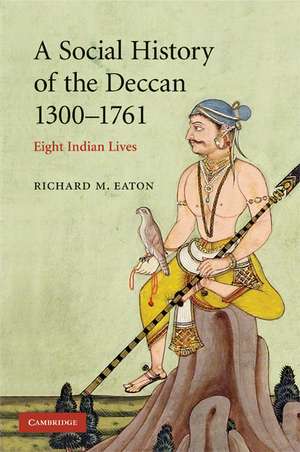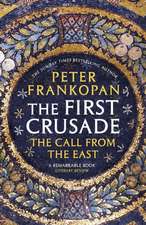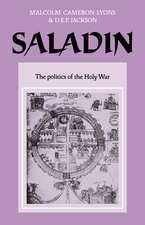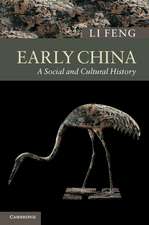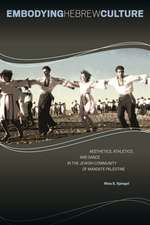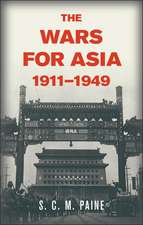A Social History of the Deccan, 1300–1761: Eight Indian Lives: The New Cambridge History of India
Autor Richard M. Eatonen Limba Engleză Paperback – 5 mar 2008
| Toate formatele și edițiile | Preț | Express |
|---|---|---|
| Paperback (1) | 206.18 lei 6-8 săpt. | |
| Cambridge University Press – 5 mar 2008 | 206.18 lei 6-8 săpt. | |
| Hardback (1) | 695.93 lei 6-8 săpt. | |
| Cambridge University Press – 16 noi 2005 | 695.93 lei 6-8 săpt. |
Din seria The New Cambridge History of India
-
 Preț: 233.80 lei
Preț: 233.80 lei -
 Preț: 200.13 lei
Preț: 200.13 lei -
 Preț: 201.98 lei
Preț: 201.98 lei -
 Preț: 239.11 lei
Preț: 239.11 lei - 11%
 Preț: 711.33 lei
Preț: 711.33 lei - 14%
 Preț: 1023.39 lei
Preț: 1023.39 lei -
 Preț: 202.52 lei
Preț: 202.52 lei -
 Preț: 203.67 lei
Preț: 203.67 lei -
 Preț: 324.26 lei
Preț: 324.26 lei -
 Preț: 227.33 lei
Preț: 227.33 lei -
 Preț: 201.76 lei
Preț: 201.76 lei -
 Preț: 200.99 lei
Preț: 200.99 lei -
 Preț: 204.48 lei
Preț: 204.48 lei -
 Preț: 201.98 lei
Preț: 201.98 lei -
 Preț: 203.89 lei
Preț: 203.89 lei -
 Preț: 322.51 lei
Preț: 322.51 lei - 14%
 Preț: 997.04 lei
Preț: 997.04 lei -
 Preț: 337.93 lei
Preț: 337.93 lei -
 Preț: 225.97 lei
Preț: 225.97 lei -
 Preț: 205.62 lei
Preț: 205.62 lei -
 Preț: 225.20 lei
Preț: 225.20 lei
Preț: 206.18 lei
Nou
Puncte Express: 309
Preț estimativ în valută:
39.46€ • 42.84$ • 33.14£
39.46€ • 42.84$ • 33.14£
Carte tipărită la comandă
Livrare economică 22 aprilie-06 mai
Preluare comenzi: 021 569.72.76
Specificații
ISBN-13: 9780521716277
ISBN-10: 0521716276
Pagini: 236
Ilustrații: 16 colour illus. 6 maps 3 tables
Dimensiuni: 152 x 229 x 15 mm
Greutate: 0.43 kg
Editura: Cambridge University Press
Colecția Cambridge University Press
Seria The New Cambridge History of India
Locul publicării:Cambridge, United Kingdom
ISBN-10: 0521716276
Pagini: 236
Ilustrații: 16 colour illus. 6 maps 3 tables
Dimensiuni: 152 x 229 x 15 mm
Greutate: 0.43 kg
Editura: Cambridge University Press
Colecția Cambridge University Press
Seria The New Cambridge History of India
Locul publicării:Cambridge, United Kingdom
Cuprins
1. Pratapa Rudra (c.1289–1323); 2. Muhammad Gisu Daraz (1321–1421); 3. Mahmud Gawan (1411–81); 4. Rama Raya (1484–1565); 5. Malik Ambar (1548–1626); 6. Tukuram (1608–49); 7. Papadu (1695–1710); 8. Tarabai (1675–1761).
Recenzii
'Richard Eaton has again magisterially pushed back the boundaries of history writing on pre-colonial South Asia. Eight Indian Lives, inspired in part by Vermeer's `finely crafted portraits with their distinctive play of light' (p. 2) follows the fortunes of eight key figures in the history of the Deccan, moving seamlessly from meticulously constructed accounts of their lives to the political, linguistic and physical landscapes they inhabited.' Samira Sheikh, Indian Economic and Social History Review
'Eaton elegantly vindicates his decision to chronicle social history through the lives of extraordinary people.' Michael Neale, Asian Affairs
'In Social History of the Deccan Eaton demonstrates once more that he is a great master of locale and epoch. Through the use of eight individuals' lives from the 14th to the 18th centuries, Eaton magnificently articulates the main social, political, religious and economic issues of the time. He has an uncanny sense of why a development arises when it does, where it does and what its great importance is. Here he returns to the Deccan, where he had his first great insights into the function of Sufism and its relation to politics.' Eugene F. Irschick, University of California, Berkeley
'This book is a masterful achievement, as Richard Eaton focuses each chapter on the social history of Deccan on a single person, using that person's life to develop his themes and illustrate the times. His well-chosen subjects range widely; my favorite is the Maratha heroine Tarabai, who is brought vividly to life and demonstrates not only her own power but the dominance of Chitpavan Brahmans in the expanding Maratha empire, still Indo-Muslim in culture in the 18th century. Full biographies were seldom possible, given the sources for his time period, but Eaton's strategy succeeds in making the social history of the Deccan accessible and exciting.' Karen Leonard, Anthropology, University of California, Irvine
'In this account of one of the least-known parts of South Asia, Eaton recounts the history of the Deccan plateau in southern India from the 14th century to the rise of European colonialism.' The Times Higher Education Supplement
'Eaton elegantly vindicates his decision to chronicle social history through the lives of extraordinary people.' Michael Neale, Asian Affairs
'In Social History of the Deccan Eaton demonstrates once more that he is a great master of locale and epoch. Through the use of eight individuals' lives from the 14th to the 18th centuries, Eaton magnificently articulates the main social, political, religious and economic issues of the time. He has an uncanny sense of why a development arises when it does, where it does and what its great importance is. Here he returns to the Deccan, where he had his first great insights into the function of Sufism and its relation to politics.' Eugene F. Irschick, University of California, Berkeley
'This book is a masterful achievement, as Richard Eaton focuses each chapter on the social history of Deccan on a single person, using that person's life to develop his themes and illustrate the times. His well-chosen subjects range widely; my favorite is the Maratha heroine Tarabai, who is brought vividly to life and demonstrates not only her own power but the dominance of Chitpavan Brahmans in the expanding Maratha empire, still Indo-Muslim in culture in the 18th century. Full biographies were seldom possible, given the sources for his time period, but Eaton's strategy succeeds in making the social history of the Deccan accessible and exciting.' Karen Leonard, Anthropology, University of California, Irvine
'In this account of one of the least-known parts of South Asia, Eaton recounts the history of the Deccan plateau in southern India from the 14th century to the rise of European colonialism.' The Times Higher Education Supplement
Notă biografică
Descriere
A rich narrative history of the Deccan, portrayed through eight Indian lives.
